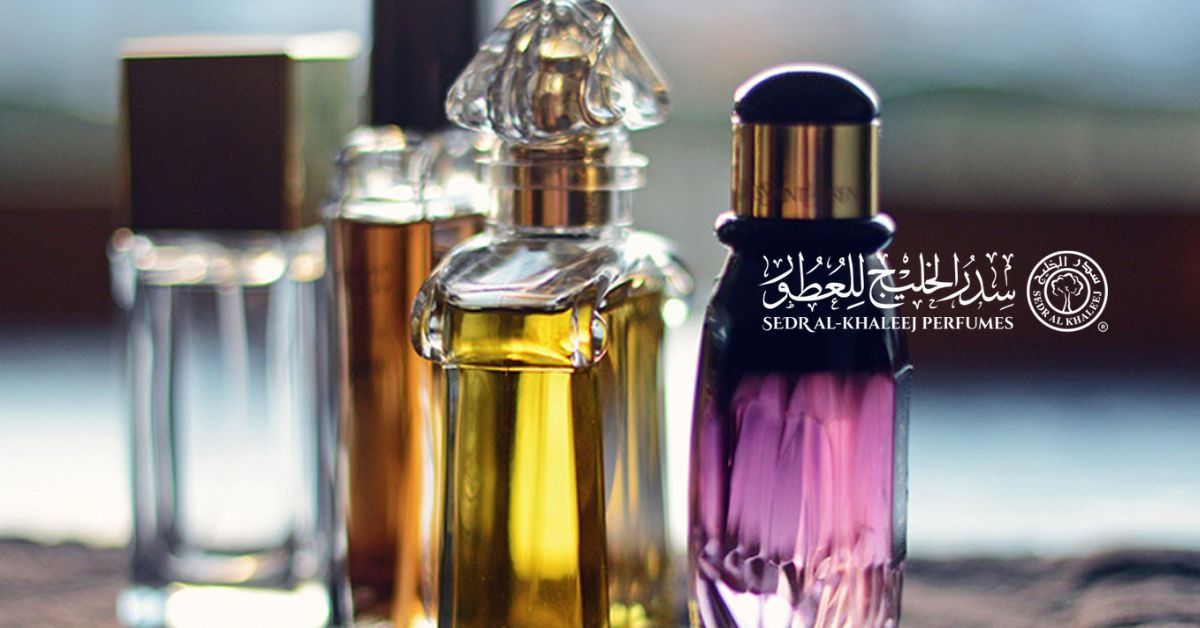The history of perfumery spans thousands of years and is constantly evolving to achieve greater variety and appeal. The perfumery isn't just for large corporations; individuals can also create their own fragrances using essential oils.
Sedr Al-Khaleej 's comprehensive guide to Sedr Al-Khaleej , where you will learn about the best essential oils that can be used to make perfumes in a unique and distinctive way

What are essential oils?
Essential oils are concentrated compounds extracted from plants that contain the essence of the plants' natural odor. These oils are typically extracted by steam distillation or cold pressing. Essential oils are used for a wide range of purposes, including perfumery, aromatherapy, and as ingredients in cosmetics and household products.
Here are some examples of popular essential oils and their sources:
- Lavender: Extracted from the flowers of the lavender plant, lavender is known for its clean and refreshing scent.
- Bergamot: Extracted from the peel of the bergamot fruit, it has a distinctive citrus aroma.
- Jasmine: It is obtained from jasmine flowers and is characterized by its sweet and rich aroma.
- Sandalwood: Extracted from the wood of the sandalwood tree, it is known for its warm, deep, woody scent.
- Peppermint: Extracted from mint leaves, it provides a fresh and clean scent.
- Lemon: Extracted from the peel of a lemon, it is known for its pure citrus aroma.
These oils are essential building blocks in perfumery because they provide the main scents that make up a fragrance.
Essential Oils Basics
Considered raw essential oils are an essential part of the world of perfumeryand are the key ingredient that gives perfumes their personality and unique fragrance. Let's first learn what essential oils are and how they are extracted.
What are essential oils and how are they extracted?
Essential oils are aromatic substances that are extracted from plants and flowers in certain ways. These oils contain natural aromatic compounds that give them their unique scents.
Extraction can be done by methods such as distillation and pressing, where steam or solvents are used to extract oil from plant material. Other methods such as puncture and pressurization can also be used.
The difference between essential oils and synthetic essential oils
Although essential oils and synthetic essential oils used in perfumery. there is a big difference between them. Essential oils are natural substances extracted from plants, while synthetic essential oils are made are made in laboratories using chemicals.
Essential oils are characterized by carrying the purity of nature and their distinctive natural scents, while synthetic essential oils offer a wide range of scents that can be precisely synthesized.

Best Essential Oils for Perfumes
1. Acidic oils
- Lemon: Lemon oil has a refreshing and energizing scent, making it perfect for summer fragrances.
- Bergamot: Bergamot oil has a distinctive citrus flavor and bright aroma, and is commonly used in fresh and light fragrances.
- oranges: Orange oil adds a touch of warmth and enthusiasm to fragrances, and is characterized by its sweet, citrusy aroma.
2. Wood oils
- Sandals: Sandalwood oil gives perfumes a warm, rich flavor and is an ideal choice for oriental and woody fragrances.
- rice: Cedar oil has a deep, woody aroma and is commonly used in elaborate perfumes.
- Patchouli: Patchouli oil gives fragrances a mysterious and earthy touch, and is characterized by its woody and spicy aroma.
3. Floral oils
- Rose: Rose oil enhances perfumes with a soft and romantic floral flavor and is one of the most popular oils in perfumery.
- Lavender: Known for its calming and refreshing scent, lavender oil is used in everyday fragrances and relaxing products.
- Jasmine: Jasmine oil gives perfumes a luxurious floral touch and is considered a symbol of femininity and elegance.
4. Modern oils
- Vanilla oil: Vanilla oil gives perfumes a sweet and creamy flavor and is used in warm and sweet fragrances.
- Cocoa oil: Cocoa oil has a chocolaty and creamy scent and is used to add a delicious touch to perfumes.
- Coffee oil: Coffee oil enhances fragrances with a roasted and spicy flavor, and adds a distinctive coffee aroma.

Using essential oils in perfumery
Ideal ratios for using essential oils
When you decide to use essential oils or so-called crude essential oils to create your own fragrance, the optimal ratios must be observed to ensure a balance of scents. Typically, the ratios in perfumes are usually as follows:
base oil: Makes up about 15-30% of the fragrance.
Heart oils: Make up about 40-50% of the fragrance and express the main flavor of the fragrance.
Base oils: Make up about 10-20% and contribute to the stabilization of scents and give the fragrance its lasting character.
How to Blend Essential Oils
To mix essential oils effectively, it's best to channel the heart you want for perfume. Professional tools such as glass cylinders or shaded vials can be used to blend the oils. You should carefully experiment with ratios and blending to achieve the desired fragrance.
Common Applications of Essential Oils in Fragrances
- Personal fragrances: You can create your own personalized fragrance that expresses your own identity and taste.
- Body oils: Essential oils can be added to body oils and lotions to care for the skin and add a fresh scent.
- Vaporizers and home fragrances: Essential oils can be used in vaporizers and household products to give the place a distinctive scent.
- Hair oils and beard oils: Essential oils can also be added to hair and beard care products to improve their scent and nourish them.

Tips for choosing essential oils
Choosing essential oils depends on your personal preferences and needs, and can be fun and creative. Always remember that quality and safety are key to the experience of using essential oils.
Personal preferences and fragrance types
One should start by clarifying one's personal preferences when it comes to types of perfumes. Do you like perfumes floral and sweet or do you tend to fragrances woody and citrusy fragrances? This interest in fragrances will guide you towards choosing the right essential oils.
Essential Oil Quality
Quality is crucial when choosing essential oils. Make sure you buy oils from trusted sources and recognized suppliers. High-quality oils will give you a natural, pure scent and a better experience.
Safety and allergies
You should be careful of allergies and safety when using essential oils. Some oils may cause skin reactions in some people. Therefore, before applying oils directly to the skin, a simple test should be done on a small area of skin to check for allergic reactions.

Storing and caring for essential oils
Good care with essential oils contributes to maintaining their quality and shelf life. By complying with the following guidelines, you can enjoy the benefits of benefits of essential oils for longer and use them effectively in perfumery, skin and hair care.
How to Store Essential Oils Properly
Essential oils should be storedessential oils in shaded bottles specifically designed for their preservation. These bottles help prevent the damaging effect of light and air on the quality of the oils.
Store containers in a cool, dry place, and avoid exposing them to excessive heat and humidity, as oils can be damaged in these conditions.
Be sure to close the containers tightly after each use to prevent air from seeping into the oils.
Caring for oils to maintain their quality
- Avoid exposing oils to direct sunlight as light can ruin essential oils.
- Use a clean dropper when pulling the oil out of the bottle instead of pouring it directly from the bottle. This prevents possible contamination of the oil.
- Be careful not to leave containers open for long periods of time, as some of the aromatic compounds can evaporate.
- Store oils out of the reach of children and pets, as some oils can be toxic if ingested or applied incorrectly.
FAQ about raw essential oils
What is the difference between essential oils and regular essential oils?
Essential oils are natural substances extracted from plants in certain ways, while regular essential oils contain synthetic and chemical odors produced in laboratories.
Can essential oils be used directly on the skin?
Essential oils can be used on the skin, but they should be diluted or mixed with carrier oils before use to avoid irritation.
Are there essential oils suitable for each season?
Yes, there are essential oils for every season. For example, citrus oils are suitable for summer, while woody oils are suitable for fall and winter.
Can essential oils be used to make home fragrances?
Yes, essential oils can be used to make home fragrances. They are used to give home scents a distinctive and pleasant aroma.





Leave a comment
All comments are moderated before they are published.
This site is protected by hCaptcha and the hCaptcha Privacy Policy and Terms of Service apply.